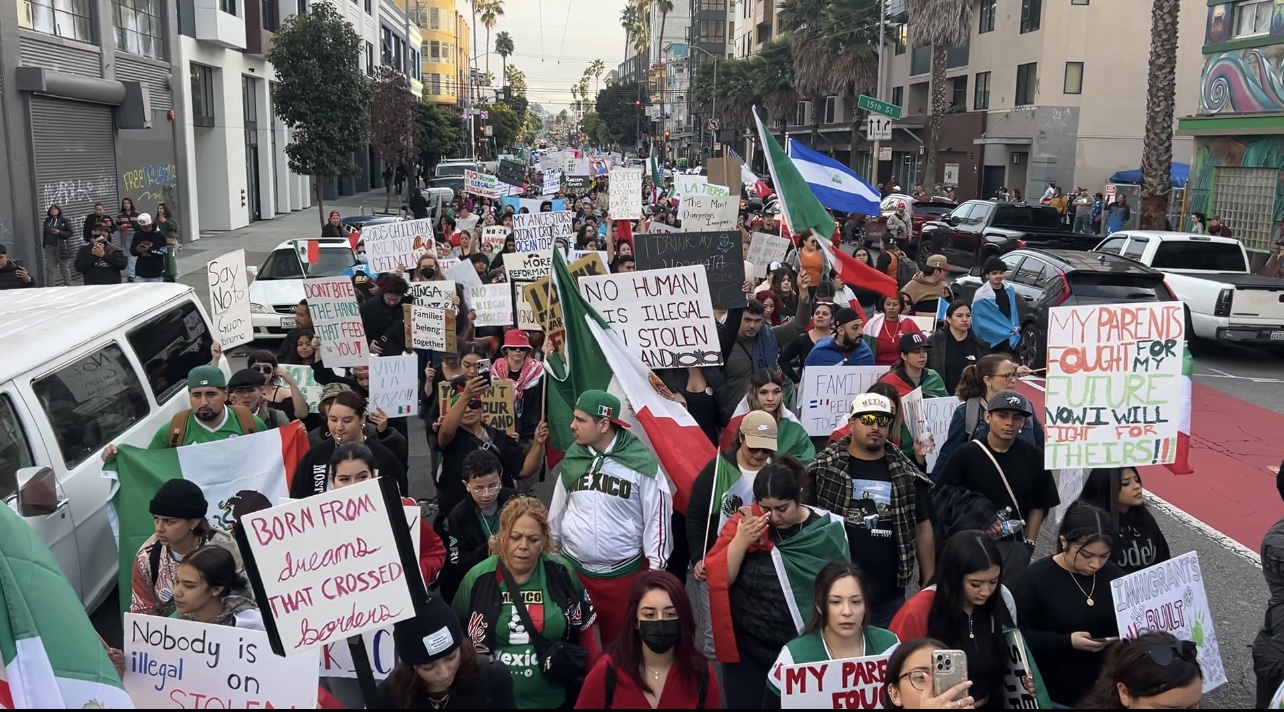
Listen to this note:
On Sunday, with the sun still rising, marchers gathered in front of San Mateo City Hall at 6:30 a.m. traveling as far as the Central Coast, Central Valley, Sacramento and everywhere in between to prepare to start the 21 mile march, which would take 10 hours to complete.
The peaceful march organized by Rights over Borders started from San Mateo City Hall with check-in points at, San Bruno, and Daly City to allow people to rest, hydrate and grab snacks before continuing to march to San Francisco City Hall. This was organized during Presidents day weekend as a form of resistance against President Trump’s anti-immigration rhetoric, and anti-immigration policies.
In the Latino community it’s not uncommon for the eldest daughters to be the trailblazers in their families, and push the boundaries of social norms. The women behind Sunday's March were no exception.
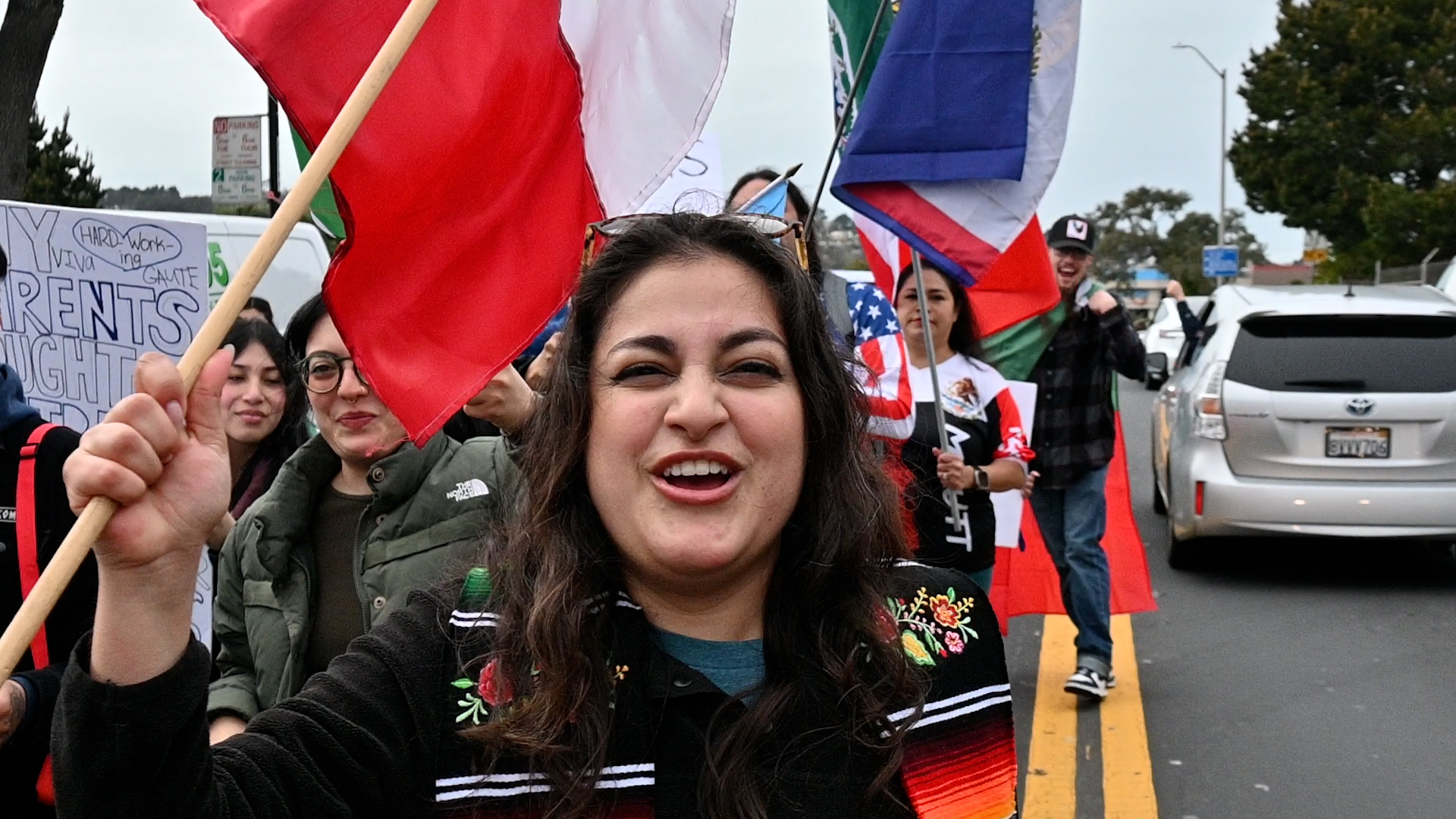
San Mateo County residents: 19-year-old Vanessa Arriaga, 21-year-old Jenaly Carreno, 22-year-old Zandra, and 22-year-old Vivian Andrea Valdez are all the eldest daughters of their families, and come from an immigrant background. These women all have different stories of how their families immigrated to the United States.
Jenaly being Chinese-Peruvian/Chilean, and the rest of the girls being Mexican, but all with the same fire of wanting to use their U.S citizenship to stand up for all immigrants not just undocumented immigrants who are being targeted against Trump's anti-immigration rhetoric, and send a message to the President that, the Latino community is united, and will not be forced in the shadows of America.
Vivian who came up with the initial idea for Rights over Border said, “I felt useless, and I didn’t have any political background beyond attending a few marches, but never organized a protest or march. I randomly put the idea out on TikTok, and basically recruited anyone. I was thinking local, and something very small.”
She said she reached out to a lot of organizations but no one really took it seriously at first, “I decided to create my own organization, and create a march”. Posting her idea on TikTok Vivian said that's when she met Zandra, Jenaly and her cousin Vanessa who stepped up to create Rights over Border.
This was extremely important to all the girls because they all witnessed how Trump's rhetoric caused a lot of fear in the undocumented community making people scared to leave the house due to fears of being picked up by ICE. The last time Trump was in office back in 2017 the girls were in middle school, and high school.
Zandra said, “ I felt powerless at that moment. But now that I have my voice, and I found my voice – I can fight and show how unjust this is.”
Marchers set off on the long journey at 7:00 a.m. The symbolism behind the 21 miles was to make a statement of the length the latino community is willing to go to fight for justice, and stop the hate of immigrants. It was also meant to represent the long voyage many immigrants make in order to cross the border due to fleeing poverty, and violence according to the Rights over Borders organizers.
Lissette Leon, from San Mateo was one of the marchers who attended, she was stunned to hear the organizers had no political experience in organizing before, “It felt very well organized. What I love most is that it is a peaceful protest, and police support making us feel safe, and most importantly it does feel like a peaceful protest.”

During the march people naturally got tired and decided to Uber, or take public transit to meet the rest of the marchers at San Francisco City Hall, however the march never got smaller, it continued to grow. At each checkpoint there would be a group of dozens of people ready to join the strenuous march to San Francisco.
Rights over Borders, recognized the march would be a difficult trek so they partnered with the United Farm Works, and many other organizations to have a traveling porta potty available for people to use. Volunteers also use their cars to help give people breaks from walking by driving them to the front of the line to help them keep up. Right over Borders also had volunteers passing out waters to keep people hydrated.
Marchers grabbed the attention of the community along the way, with people waving the Mexican flag, or their country’s soccer team jersey outside their windows, screaming, “¡Sí Se Puede!” corner stores also started to place water bottles outside for marchers to grab, children stuck their heads out the window to see the long line of marchers, and people inside restaurants and stores trickled outside to see the caravan of cars and marchers pass by.
18-year-old, Shantal who is from San Mateo was one of the hundreds of marchers who joined in on the 21 mile march. She hopped on the back of a white pickup truck organized by the United Farmer Workers to help give rides to marchers who were tired.
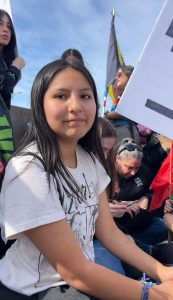
The truck also hauled the designated porta potty for marchers. There were multiple marchers sitting down criss-cross, and standing up against the sides of the bed of the truck to make room for everyone who was exhausted. The truck packed in marchers like sardines in order to leave no one behind.
As the truck approached South San Francisco Shantal said, “My toes hurt a lot, and I do hurt a lot. My voice cracked a little bit because I kept on yelling and chanting but other than that I was still going strong.”
She also said “If they [immigrants] can walk hundreds of miles then we can do a few”. This protest was personal to Shantal because she is an immigrant along with her family. She was originally born in Peru, but was able to come to the United State with her family through a visa lottery.
The march finally reached the heart of the Mission District where people stopped marching on the sidewalk, and flooded to the streets with the support of police officers. People once again started to wave their flags outside their windows.
People from the sidewalk saw the marcher and decided to join the crowd. It was like a large wave of color — people from all different kinds of nationalities were marching and holding signs saying, “No Human is illegal.”, “Deport Elon”, and “Viva la Raza”. Flags were held up in the crowd from all over like Mexico, Guatemala, El Salvador, Nicaragua. There was even a flag representing the Philippines. But Red, white and Green undeniably were the colors most visible amongst the crowd.
Women having red, green, and white ribbons weaved in their braided hair, jerseys, or having their face painted. Organizers played songs by Kendrick Lamar with the crowd going hard on the lyrics, “They not like us, They not like us”.
From the Mission District the crowd continued to march through the city to get to San Francisco City Hall where there was a large crowd of people waiting to greet the marchers.
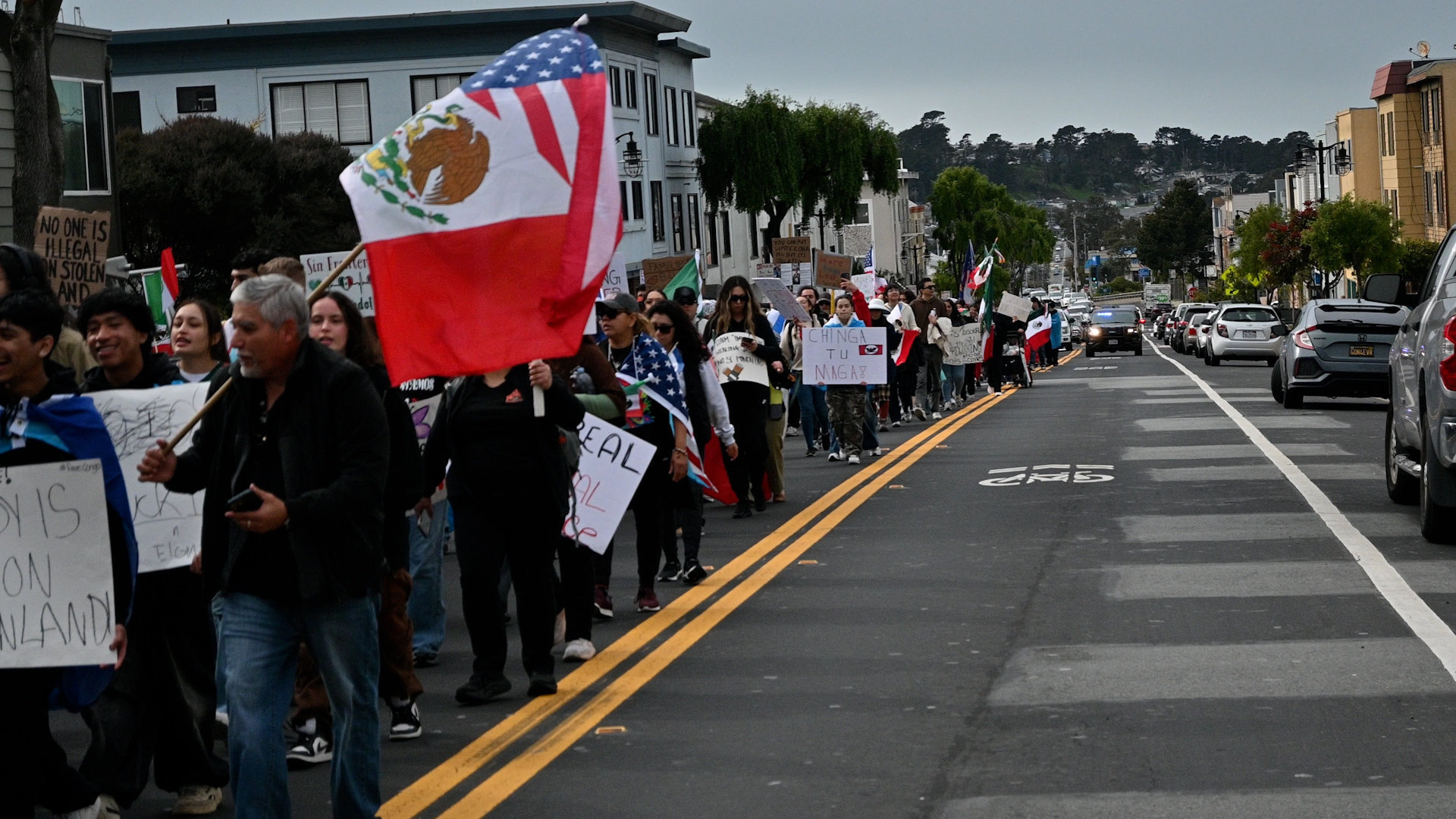
After being greeted at city hall, Rights over Borders had guest speakers from Brown Issues, Ayudando Latinos A Soñar, and multiple activists.
California State Senator Scott Wiener also made an appearance saying, “They’re [the Trump Administration] throwing so much at us and it’s so easy to curl up in a ball and say I don’t want to watch the news anymore. I don't want to pay attention, but we have to pay attention!
We have to know what is happening!” He was then cut off by someone in the crowd who yelled out, “THEN DO SOMETHING”. Senator Wiener continued with his speech but was eventually cut off again. Wiener finished his speech and walked away from the crowd once a marcher interrupted the Senator by yelling out, “He introduced SB 276 two weeks ago… He’s been criminalizing street vendors. He’s one of the reasons why the mission looks like that… He tried to look good for the camera… Never do that again!”
Senate bill SB 276 was introduced on February 04, 2025 by Senator Scott Wiener. The bill has a long way to go before it’s signed by the governor, but if passed it would make it illegal to knowingly buy, receive, and sell stolen property. If convicted people can receive a misdemeanor or even a felony if the value of the goods are $950 or higher.
Peninsula 360 Press reached out to Senator Scott Weiners office for comment, but did not receive one by our deadline.
Afterwards guest speakers spoke with the same message of staying united and fighting against hate by still showing up, and how the work doesn’t end after one march.
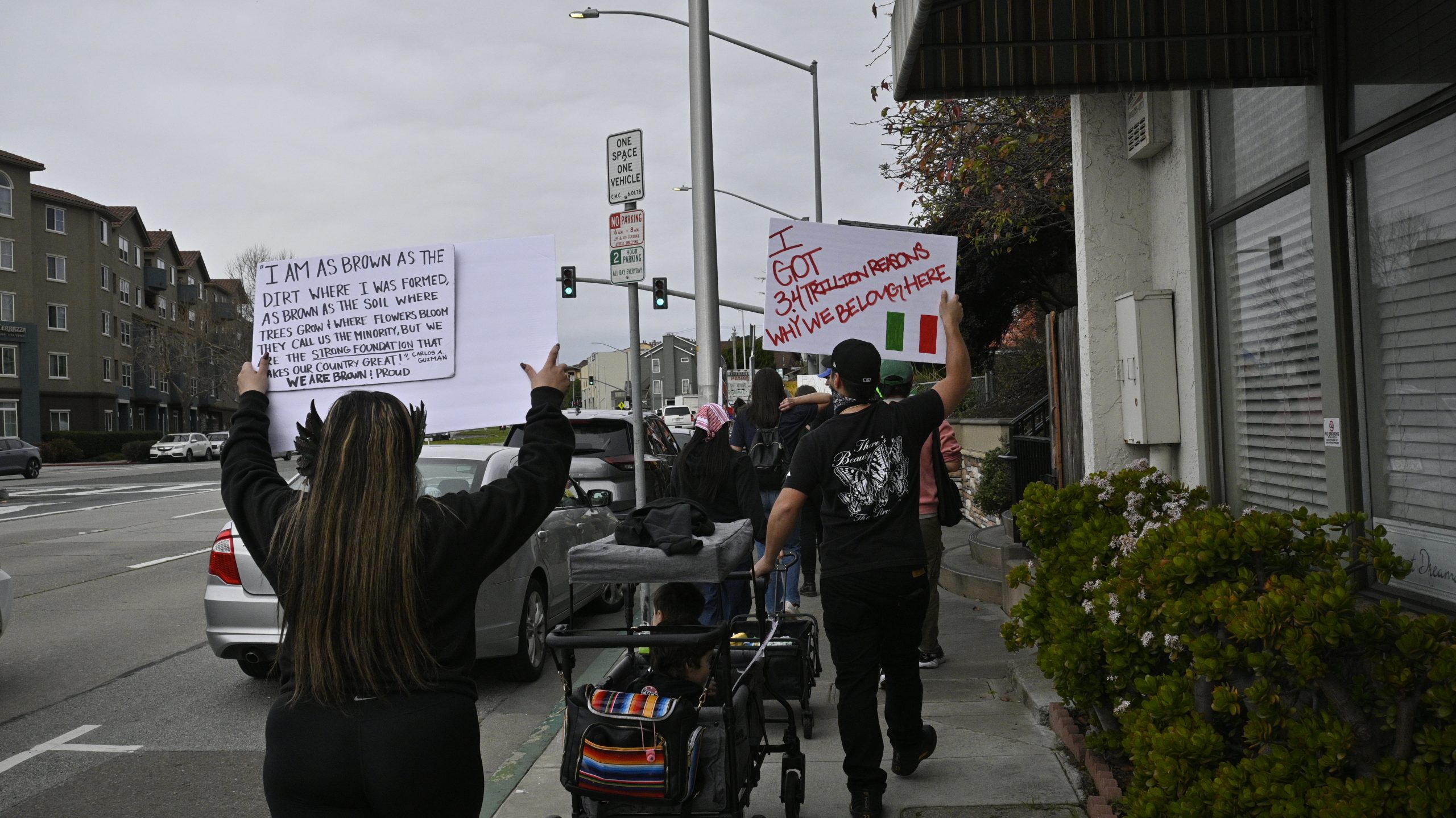
Standout guest speaker Sasha Ritzie-Hernandez, who is a community organizer in Oakland, and Executive director of none-profit, Somos Familia Bay had a clear message to the audience, “Young latinas stay in school! Go to school! I need lawyers, I need doctors, I need you to go back to school and beat them at their game! And If you don’t like college then that's fine go to a trade build shit! Build it!”
She later closed her speech saying, “We talk about the American Dream, well guess what? If they do not let us DREAM! We will not let them SLEEP!” Immediately after, the crowd roared with applauses, and cheers. They chanted “¡Sí Se Puede! ¡Sí Se Puede! ¡Sí Se Puede!”
Recognizing the long day, and with it being a cultural norm in the latino community, Rights over Borders in collaboration with grassroot efforts ended the night with a group photo, and free pizza for everyone.
You may be interested in: Hate crimes against ethnic minorities on the rise in rural California

